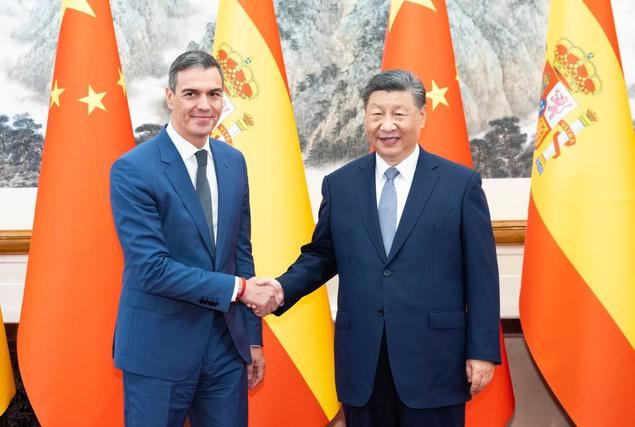Bilateral relationship
As the 20th anniversary of the Comprehensive Strategic Partnership approaches in 2025, the overall outlook on the bilateral relationship could well be described as optimistic and constructive. China is a trading partner of growing significance, both in terms of overall volume and its impact on key sectors of the Spanish economy—from olive oil to pork and beyond. Today, areas such as automotive and sustainable mobility, tourism and culture, digitalization, and technology in general offer further opportunities for enhanced cooperation.
In recent years, Spain—one of the eurozone’s most dynamic economies—has attracted significant Chinese investments in regions such as Murcia, Zaragoza, Cáceres, and Barcelona. These could soon be joined by new agreements, further strengthening economic ties.
This new visit by the Spanish President highlights that Madrid is prepared and willing to collaborate with China to deepen mutual strategic trust, boost exchanges and high-quality cooperation, and promote the solid and stable development of bilateral relations. To make these goals feasible, it is essential to expand and intensify communication and coordination, as well as the implementation of the important and growing consensus reached between both leaders.
The European framework
Spain plays a prominent role within the EU. President Sánchez is a leading figure of social-democratic policies in a context of rising conservative and far-right forces. Recently, he has maintained a distinctive profile in the major EU debates, including the current one concerning defense investment, establishing himself as a key interlocutor whom China values when assessing support for a shared strategy aimed at defining new balances in key areas.
Therefore, the Spanish leader's visit could contribute to the recovery and advancement of ties between China and the European Union, especially in the context of changes in the transatlantic dynamic and Europe's current economic challenges. In February, Foreign Minister José Manuel Albares told the Financial Times that “the EU should develop its own policy towards China and not imitate the confrontational stance of the U.S.” Europe must retain the ability to decide for itself when China can be a partner and when it can be a competitor, he added, without being swayed by inertia or, worse still, demands that undermine the long-standing commitment to defending a fair and equitable trading order.
China's stance in support of Europe's presence in negotiations regarding the future of Ukraine is appreciated in Madrid. If the disagreement between the EU countries and Washington on this and other matters deepens, Brussels must foster a new perspective on China that takes European interests into greater consideration. Sánchez's trip should be understood in the context of this gradual and quiet but notable strategic recalibration toward China, increasing in pace as these trends strengthen.
In recent years, following the shift brought by the first Trump Administration, EU-China relations have been significantly affected by a substantial hardening, despite no fundamental conflicts of interest or insurmountable geopolitical contradictions. In fact, at present, China is a key natural partner for the EU on two crucial issues: trade and the environment. In contrast, Washington is, objectively, the main threat to EU policies on both of these decisive issues.
International Geopolitical Context
Sánchez has not shied away from criticizing the tariff policies and other measures of the new Donald Trump administration. This context is crucial for understanding the significance of this third visit, as it will help strengthen the vitality of the set of principles (opposition to protectionism, defense of free trade, multilateralism, international law, stability of industrial and supply chains, commitment to fighting climate change and sustainability...) that fuel Europe's disillusionment with the US and, by extension, bolster the shared interest in securing stability in an extremely volatile environment, with changes in internal policies and external strategies under pressure.
Thus, the Sino-Spanish relationship stands as a paradigm and example for others of how, despite systemic differences, values, and respective regional and international commitments, there is a fertile ground for cooperation for the benefit of development.




 Si (
Si ( No(
No(












